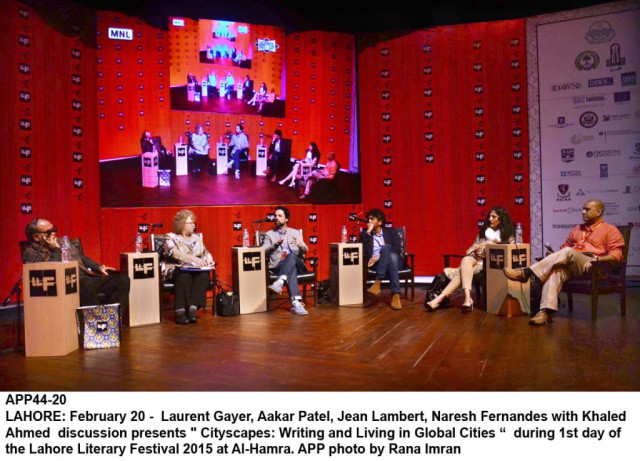‘MQM unlikely to survive sidelining of its chief’
Role of migrants in rise of Karachi and Mumbai discussed .

Laurent Gayer, Aakar Patel, Jean Lambert, Naresh Fernandes with Kkaled Ahmed discussion presents "Cityscapes:Writing and Living in Global Cities" during the Lahore Literary Festival 2015. PHOTO:APP
Muttahida Qaumi Movement is unlikely to survive the sidelining of its chief, French academic Laurent Gayer said at the afternoon session on Cityscapes: Living and Writing in Global Cities at the Lahore Literary Festival on Friday.
He was responding to a question from the audience regarding the possibility of Altaf Hussain running out of favour with the authorities in London and Islamabad.
Gayer, who has recently published a book on Karachi titled Ordered Disorder of Karachi, said the MQM was a highly centralised party with most of its powers vested in the person of Hussain. He said the party had never had a second-tier leadership which was connected to the grassroots. “The coordination committee is just the party’s public face. It does not have real power.”

However, he said, there was no reason to assume that Karachi would be rid of violence if the MQM ever became a political nonentity. “The MQM’s decline would be as violent as its rise to power,” he said.
Gayer traced the emergence of violent politics in Karachi to the rise of the Pakistan Peoples Party in Lyari. He said before the PPP established a foothold in the area, it had been home to a grassroots workers’ movement. He said the movement weakened as PPP leaders started patronising gangsters in the area who could be relied upon to muster support for the party. “The gangsters eventually became independent enough to undermine the authority of state officials.”
He said the PPP still relied on local thugs for support amongst Baloch communities in Lyari. He said there was no sign that the party would disengage with them in the near future as it lacked a grassroots organisation in the area.
Panellists Gayer, journalist Aakar Patel and author Naresh Fernandes discussed the role of Gujarati migrants in Karachi and Mumbai’s rise as megacities of the Global South. They also spoke about widespread crime and violence in the two cities.

Fernandes said though immigration played a key role in the development of the two cities, it also allowed two forms of political organisations to emerge.
“In Mumbai, politics was done on an anti-immigrant discourse, while in Karachi, the immigrants organised themselves to wrest privilege from the native population.”
Patel said the rise of Shiv Sena (and Marathi nationalism) in Mumbai was predicated on the political and economic dominance of non-Marathis, particularly Gujarati merchants. He said, at one point, the Bombay Merchants’ Chamber had voted in majority to make the city part of the state of Gujarat. “It’s as if a group in Karachi wanted to be part of Pakistan’s northern provinces.”
Patel pointed to the emergence of an economy driven primarily by the services sector and a no-holds-barred police crackdown on criminal gangs during the 1990s as reasons behind the eventual decline of violence in Mumbai. The former, he said, had made social mobility possible for people from lower and lower-middle classes. The latter enabled the state to monopolise control over means of violence, he added.
Novelist Muniza Naqvi said she felt that focusing on the so-called migrant did not offer a nuanced examination of life in Karachi. She said it would not take migrants long to feel at home in a new city because making money is the only driver of migrations.
British politician Jean Lambert was also part of the panel. Journalist Khaled Ahmed moderated it.
Published in The Express Tribune, February 21st, 2015.



















COMMENTS
Comments are moderated and generally will be posted if they are on-topic and not abusive.
For more information, please see our Comments FAQ